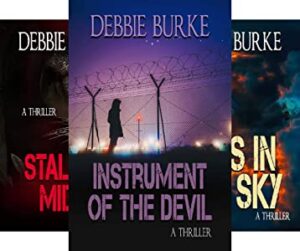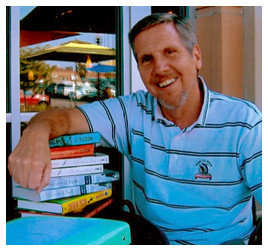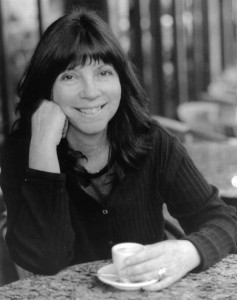By Debbie Burke
NEWSFLASH!
MOST AUTHORS HATE SELF-PROMOTION!
All right, so that’s not news to anyone at TKZ.
Truth is we’d rather parade naked down the mall than sit at a lonely table full of books in front of Barnes & Noble, directing people to the restroom.
But we gotta do it sometimes if we want to sell books.
One way to make promotion less painful is to join with other authors.
WHY?
- Misery loves company (just kidding!).
- Being in front an audience by yourself is scary. Being in front of audience with colleagues is easier.
- A solo appearance means you carry 100% of the responsibility to entertain the audience. Join with other authors and that splits the responsibility up.
- More authors draw more interest…unless you’re Lee Child, who doesn’t need help.
HOW TO DO IT?
- Find other authors.
Invite one to three other authors in your area to join you either in person or by zoom. A total of three or four offers good variety while giving everyone a chance to talk. More than that is too crowded and cumbersome.
- Decide on a genre and theme.
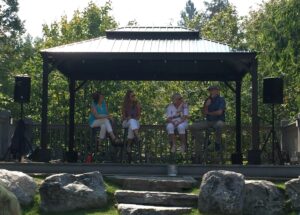
Montana authors Leslie Budewitz, Christine Carbo, Debbie Burke, Mark Leichliter
My recent event focused on crime fiction, combining four subgenres: cozy mystery (Leslie Budewitz), small town police procedural (Mark Leichliter), police procedural in a national park (Christine Carbo), and thriller (Debbie Burke). The title was “Murder, Inc. – How Montana authors kill people…on the page.”
Include variety in subgenres so there aren’t two cat cozy authors competing with each other.
For instance, a children’s literature gathering could feature one author who writes picture books, one middle grade, and one young adult, reaching three different audiences.
- Set up a venue.
Weather permitting, many people feel more comfortable outdoors these days. Depending on where you live, indoor settings may or may not be available.
I’ve been lucky to be hosted twice by a dream open-air location in Bigfork, Montana, right beside the Swan River. Lake Baked Bakery/Riverview Bar has a large grassy area with tables and chairs.
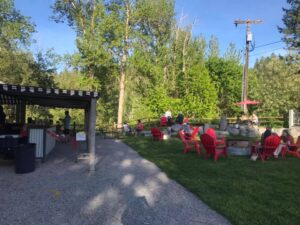
Lake Baked Bakery/River View Bar, Bigfork, Montana
Many cafes, coffee houses, brew pubs, and independent bookstores are struggling financially due to the pandemic. The ones I’ve approached are enthusiastic about hosting activities that draw more customers.
Independent-living senior communities are a good bet to find many avid readers. So are schools, community colleges, and libraries.
- Decide on a format.
A panel discussion with Q&A from the audience works well. Designate one person as moderator. S/he has a list of prepared questions and keeps the discussion moving.
If you decide to do open readings, they should be short—no more than five minutes per person, broken up with discussion and questions between authors.
- Publicize the event.
Here’s where having friends is a real force multiplier. Each author has their own blog and email list to disseminate info about the appearance. Each has their own social media followers. If there are four participants, that’s four times the number of contacts than if you did it by yourself.
Press releases to newspapers/radio are more likely to be noticed if there are three or four authors appearing together. Then it becomes an event of interest to the community instead of a lonely author crying in the wilderness.
The venue may have a Facebook page or other outlet where they publicize events. Ask them to include yours. Again, that reaches a wider, different demographic than simply reading fans.
Supplement these efforts with posters around the area and you should have a respectable turnout.
- Set up and logistics.
Scope out the venue before the event. Find out what equipment, chairs, tables, etc. they can provide and what you need to bring yourselves.
You need sound equipment–an amplifier and at least two mics for four people. If the venue doesn’t have that, you may know someone who will let you use their equipment. If not, you may need to rent it.
Leslie Budewitz is my frequent partner-in-crime for live presentations. Her husband Don is a musician and he graciously sets up and runs his equipment for us. I always buy a drink and snack for great volunteer helpers like him.
If you need Power Point capability for slide shows, verify that the venue’s system is compatible with yours. Sometimes you can put a thumb drive in their computer. Other times, it’s better to bring your own computer but check that connecting cords work.
Always, always, always test video and audio beforehand. Glitches are uncomfortable not only for you but your audience as well.
Depending on the venue, if there’s a stage, you can sit on chairs/bar stools. Or you may prefer to stand/walk around as you talk.
Set the tone. If possible, arrange the audience seating to be comfortable and relaxed. Rows of chairs are not as friendly as groupings like in a café or bar.
- The day of the event.
Arrive at least a half hour early to set up/test equipment. Always, always, always test sound equipment before the presentation.
If the venue serves refreshments, buy some and encourage others. The business is supporting you to improve their bottom line. The higher their sales, the more likely they’ll invite you back again. Thank your host and the servers and tip generously.
During the discussion, encourage the audience to ask questions. The more interaction with them, the better.
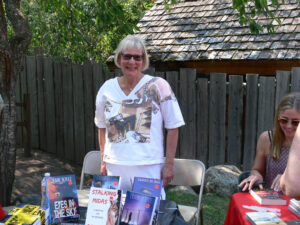 Beforehand, set up your own book table.
Beforehand, set up your own book table.
Bring pens, business cards, and swag.
Bring a signup sheet for your mailing list.
Bring change for cash purchases.
If you use a credit card reader, make sure you can log into the venue’s wi-fi.
Oh yeah, don’t forget to bring your books!
Consider holding a drawing or contest with your book as the prize. People love to win free stuff.
~~~
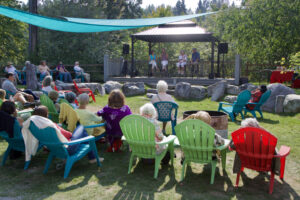
Photo credit: Kay Bjork
Take a deep breath and try to relax. Initially, you may feel like you’re going to an IRS audit but you’re not.
The audience came because they’re interested in reading. They want to learn more about you as authors and your books. Make it enjoyable for them and yourself.
We get by with a little help from our friends.
~~~
TKZers: Have you done live appearances? What tips can you offer?
If you haven’t yet done a live appearance, what is holding you back?
~~~
Debbie Burke enjoys meeting readers in person or by Zoom. To set up an appearance, please click on “Request a TKZ speaker” at the top of the page.
Here is her series sales link.

